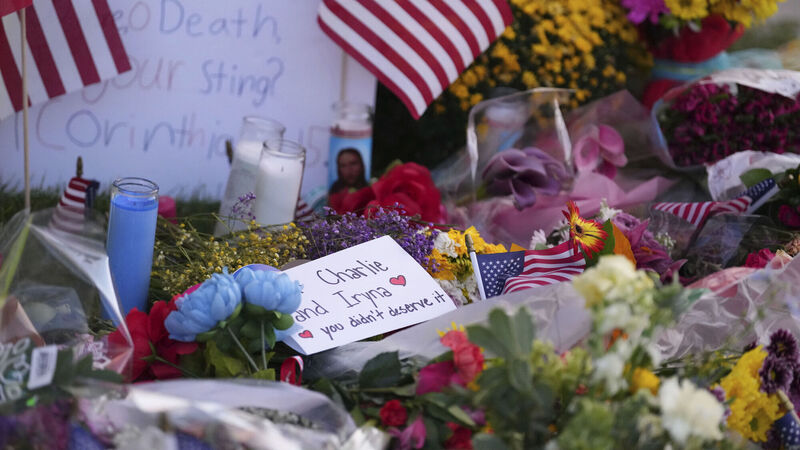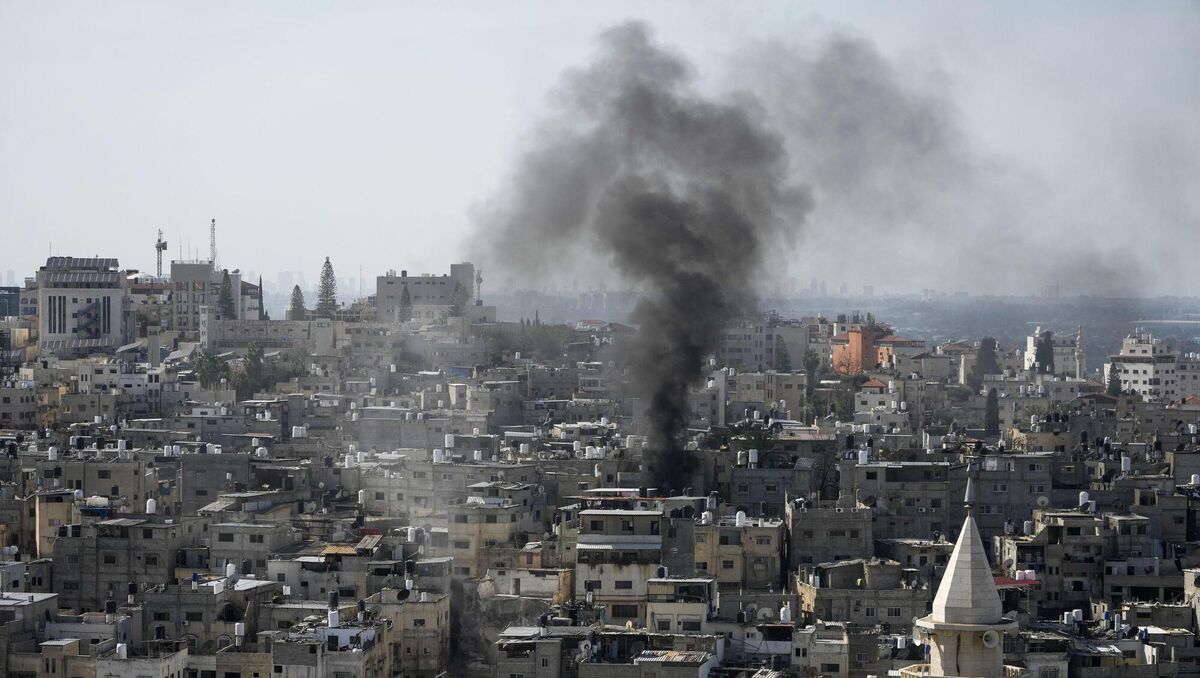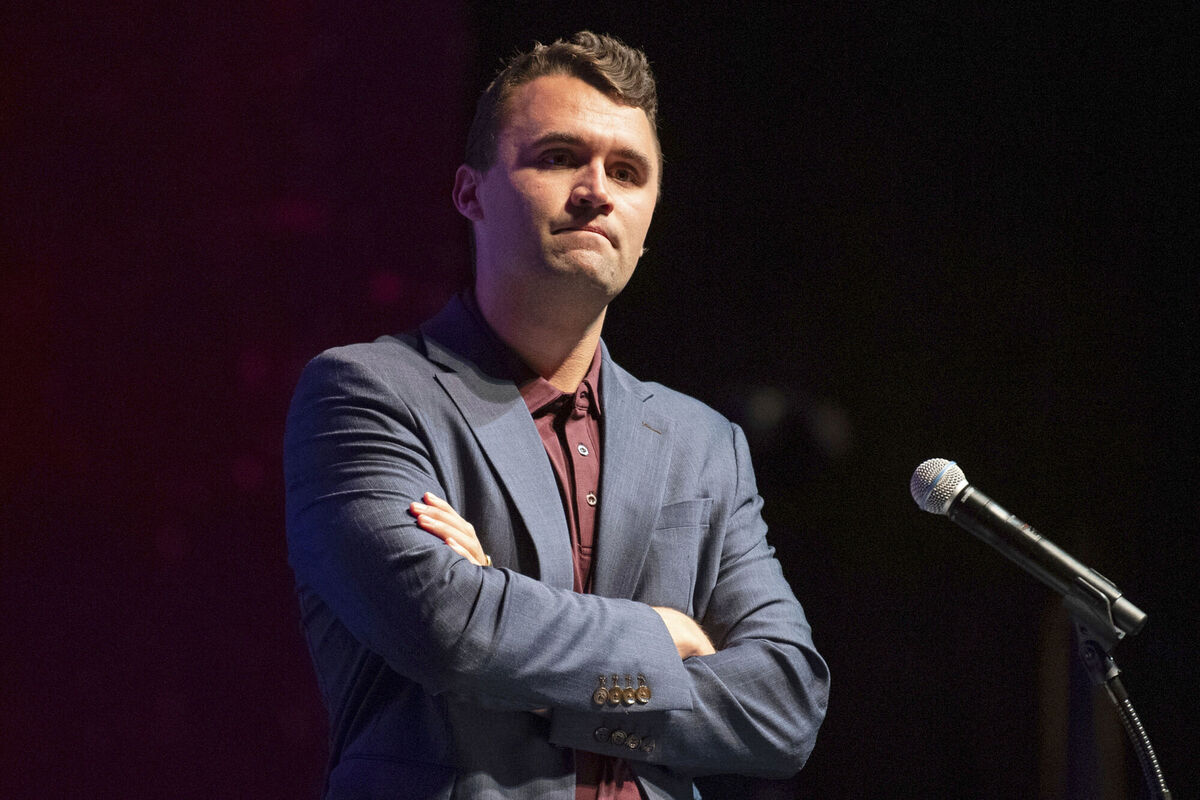Colin Sheridan: Reaction to Charlie Kirk's killing shows our selective compassion

A memorial for Charlie Kirk at Utah Valley University in Orem, Utah. Picture: AP Photo/Lindsey Wasson
The other night I saw footage of something that — in the annals of history — usually elicits a moniker to neatly capture its horror.
Kristallnacht, the Night of the Long Knives, even Bloody Sunday — each an example of a collective trauma so blunt, it’s etched in our memories, lest we ever forget.
The aerial footage I watched showed hundreds of Palestinian men and children being rounded up, and marched in single file in Tulkarem in the occupied West Bank.
Detained, interned, taken hostage, kidnapped by the Israeli military.
Around the same time this was happening, Micheál Martin and Simon Harris were likely sitting with their advisers composing social media posts, offering thoughts and prayers following the killing of Charlie Kirk in Utah on Wednesday.
The usual phrases: “appalling”, “unacceptable”, “political violence must be condemned” populated the sort of vacuous correspondence we have come to expect from political leaders. These are words no one would object to in principle.
But the rapidity, the prominence, the virtue signalling — they exposed something deeply absurd in how political care is doled out.
Because while we mark the death of — and I am looking for the kindest language possible here — an American right-wing content creator, tens of thousands elsewhere suffer horrific injustice. And for them, the silence is deafening.
As Irish and European leaders felt compelled to eulogise Kirk, condemning his killing as an assault on democracy, no comparable outrage met reports that Israeli forces imposed curfews, dragged people out of businesses and schools, pulled them from their cars, and marched them to checkpoints.
These detentions are part of a broader pattern of militarised occupation: regular raids, collective punishment, houses demolished, and movement restricted.
Yet, we see Irish politicians throwing out sympathy for an American YouTuber (“his wife and young children”) complemented by impassioned pleas to protect free speech democratic discourse. All very well.
But it is striking how one death prompts moral urgency from those who may have criticised many of the views of the man himself, while a daily reality of dozens killed and hundreds illegally detained is met with crickets.
What is this but selective compassion, shaped by media visibility, ideological proximity, and the affordances of political optics?
When someone like Charlie Kirk is killed — provocative, divisive, bigoted — his death becomes a headline.
When Palestinians and Sudanese are rounded up daily under military occupation, that suffering is buried in distant news, bracketed in “Middle East conflict”, filtered through “military operations and security concerns”.
The consciences of Ireland's political leadership only seem stirred when the victim is globally visible, when the narrative is clean: a speech, a gun, a life cut short. A wife and kids.

The problem is less the grief itself than its asymmetry.
If you condemn the killing of someone whose opinions you might despise, yet remain passive in the face of systemic injustice elsewhere — this is moral hypocrisy writ large.
First, it shapes what we think. Public attention, and thus pressure, shifts to those tragedies whose victims look more like us, whose deaths make for good sound bites, whose suffering is digestible in short tweets. The rest becomes background noise.
Second, it excuses institutional apathy. If we normalise large-scale detentions, collective punishment, disappearances, living under curfews, and internment, because “well, that’s just the way of war”, then moral accountability vanishes.
We subconsciously transfer that apathy to the marginalised within our own community — the homeless, the disabled, the migrant worker, the children in wheelchairs.
Third, hypocrisy undermines credibility.
If political leaders issue statements of concern over one act of political violence, but refuse or delay speaking on other, much worse systematic acts affecting far more people, they implicitly rank human life by race, geography, politics, and social media likes.
Charlie Kirk’s killing, then, has become the perfect allegory for how political grief is conditional.
The hero-martyr framing elevates him. Meanwhile, the Palestinians detained in Tulkarem, the children separated, and the inevitable torture many of them will face — these are acts of political violence too, they too have victims with families, children terrified, lives destroyed.

But in public discourse in Ireland, they get a fraction of the attention, a fraction of the moral condemnation.
I am not arguing that one tragedy lessens another. Grief, justice, compassion are not zero-sum.
But the discrepancy in response reveals what politicians (and societies) actually value, or feel safe valuing.
A white US activist shot dead garners banners of “freedom of speech”, “political violence”, “in defence of democracy". Palestinians detained under occupation: “security operations”, “counter-terrorism”, “collateral damage.”
They would call out arbitrary detentions, collective punishment, treatment of civilians under occupation, not only when a campaign or NGO forces media coverage.
They would apply the same moral language: human rights, dignity, justice — but with no qualifiers like “but”, “however”, “though his views were controversial”.
They would recognise that grief and moral responsibility demand more than sympathy; they demand policy, advocacy and hardest of all: action.
The universalism of human rights is constantly under threat from our selective grief.
When a politician tweets horror at the death of Charlie Kirk, but remains mostly silent on the daily death and detention and suffering of Palestinians, that is not neutrality. It is a choice.






